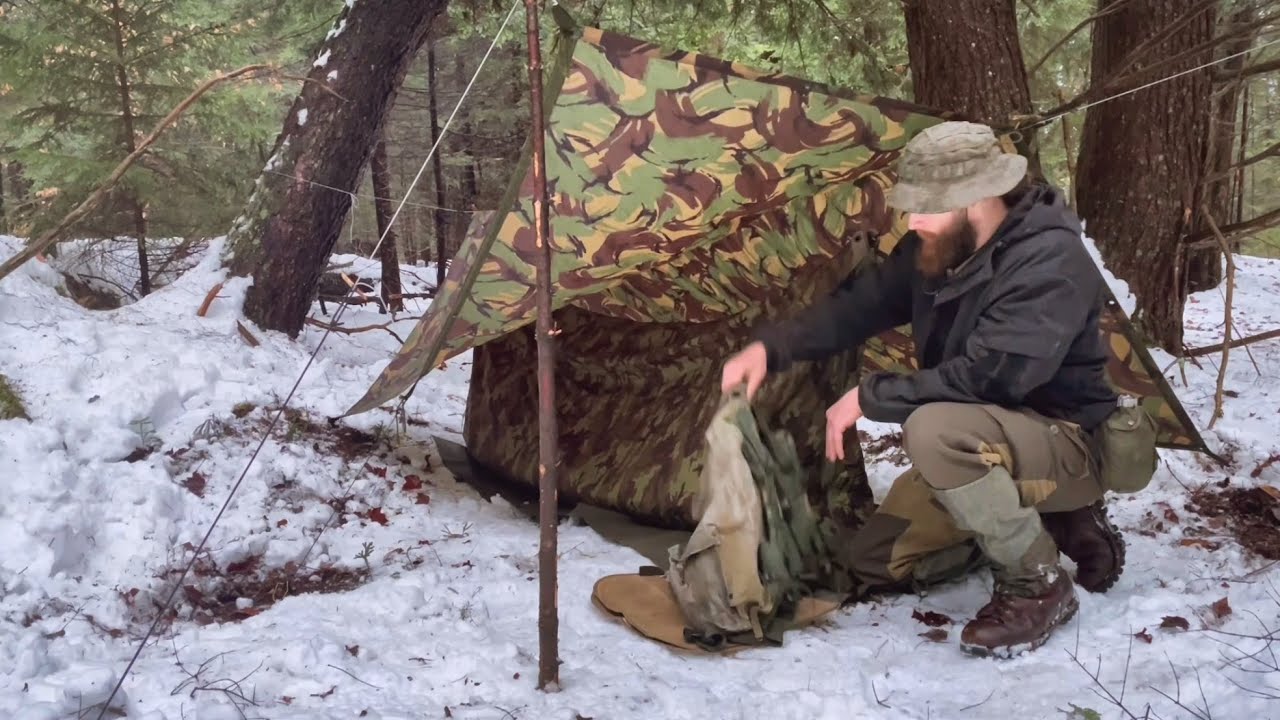For Veterans camping is often seen as a love-it-or-hate-it activity. Some people adore being out in the wilderness, while others find it to be a dreadful experience. However, it doesn't have to be this way. With the right mindset and preparation, camping can be an incredibly enjoyable adventure for everyone involved.
First, let's address the elephant in the room: why do some Veterans hate camping? From bootcamp, MOS schools and time served throughout the world, Veterans have been in the dirt. Some definitely had it worse than others. Common complaints include uncomfortable sleeping arrangements, bugs, and a lack of modern conveniences. However, these challenges can now be easily overcome when planning and equipment. Camping allows for a unique opportunity to reconnect with nature and escape the hustle and bustle of daily life, making it an ideal way to unwind and recharge.
On the other side of the coin, other Veterans will tell you that there's nothing quite like the feeling of being surrounded by nature, sleeping under the stars, and waking up to the sounds of forest. With so many benefits, it's no wonder that camping remains a popular pastime. Let’s cover everything you need to make your next camping trip not suck.
Choosing the perfect campsite
A great camping experience starts with picking the right location. Back in the day it was someone higher up the chain picking the site but now it is all on you. With so many options available, it can be difficult to determine which campsite is the best fit for your needs. Here are some factors to consider when selecting your ideal camping spot:
- Terrain: Choose a campsite with a flat and even surface for setting up your tent. This will ensure a comfortable night's sleep and minimize the risk of water pooling around your tent in case of rain.
- Shade: While it may be tempting to set up camp in an open field, remember that shade is essential for both comfort and sun protection. Look for a campsite with some tree coverage to give you a break from direct sun.
- Water access: Being close to a water source is not only convenient for cooking and cleaning but also provides a natural source of entertainment and relaxation. However, make sure your campsite is not too close to the water to minimize the risk of flooding and insects.
- Privacy: While camping is a social activity, it's also nice to have some space and privacy. Look for a campsite with some distance from neighboring campers to ensure a peaceful and enjoyable experience. Or you can VRBO yourself an island and run around naked while you look at the stars enjoying your favorite editable.
- Safety: Finally, consider the safety of the campsite. Avoid camping near cliffs, unstable terrain, or areas with a high risk of natural disasters such as floods or avalanches. You do not want to wake up in the middle of the night, go to the head and take a swan dive off a cliff.
Essential camping gear checklist
The gear that you may have used while serving has come a long way, the civilian gear available today is pretty outstanding and is essential for a successful and enjoyable camping trip. While the specific items you'll need will depend on the nature of your adventure, here's a general checklist to get you started:
- Tent: A good quality, weather-resistant tent is essential for comfort and protection from the elements. Make sure it's large enough to accommodate your entire party and their gear.
- Sleeping gear: A comfortable sleeping pad or air mattress, along with a warm sleeping bag, will ensure a great night's sleep.
- Backpack: There are so many styles and sizes of backpacks. Find the one that fits your body type and what type of camping you will be doing. (Day hikes, Backcountry Hiking)
- Cooking equipment: A portable stove, pots, pans, and cooking utensils are necessary for preparing meals. Don't forget a cooler for perishable items, and consider a lightweight, collapsible camp kitchen for added convenience.
- Lighting: Headlamps, flashlights, and lanterns are essential for navigating and enjoying your campsite after dark.
- Clothing: Be prepared for any weather by packing appropriate clothing, including waterproof gear, warm layers, and comfortable footwear.
- First aid kit: Accidents can happen, so it's crucial to pack a well-stocked first aid kit for emergency situations.
- Navigation tools: Maps, compasses, and GPS devices are helpful for navigating unfamiliar terrain and ensuring you don't get lost.
- Miscellaneous items: Don't forget items such as sunscreen, insect repellent, multi-tools, and trash bags for easy cleanup.
Top tips for setting up your campsite
Once you've chosen your perfect campsite and have all the essential gear, it's time to set up camp. Here are some tips to make the process as smooth and efficient as possible:
- Arrive early: Give yourself plenty of time to set up camp before it gets dark. This will make the process much easier and will be less stressful not having your Platoon Sgt. yelling at you to get your shit together.
- Prioritize shelter: Set up your tent and sleeping arrangements first, as these are the most critical aspects of your campsite. Make sure your tent is secure and properly staked down to prevent it from blowing away or collapsing.
- Keep wildlife in mind: Store food and scented items in airtight containers or bear-resistant canisters to prevent attracting wildlife to your campsite.
- Be prepared for the elements: Set up tarps, rain flies, or other weather protection as needed to keep your campsite dry and comfortable.
Campfire cooking: Delicious outdoor meal ideas
One of the highlights of camping is cooking and enjoying meals in the great outdoors. No more having to choke down the five fingers of death MRE. There's something about food cooked over an open flame that makes it taste even more delicious. Here are some meal ideas that are perfect for campfire cooking:
- Skewers: Assemble your favorite meats and veggies on skewers, marinate them in your preferred sauce, and cook them over the campfire for a quick and tasty meal.
- Foil packets: Create custom foil packets filled with meat, veggies, and seasonings, then cook them directly on the campfire coals for a no-fuss, no-mess meal.
- One-pot meals: Whip up a hearty stew, chili, or pasta dish using a single pot over the campfire. This makes for easy cooking and cleanup.
- Grilled sandwiches: Use a pie iron or a simple grill grate to make mouth-watering grilled cheese sandwiches or other hot sandwiches.
- Desserts: Don't forget about dessert! Classic s'mores, campfire-baked apples, or banana boats are all delicious options for satisfying your sweet tooth.
Safety tips for a worry-free camping experience
While you do not have to get a weekend safety brief anymore, when you go camping it's essential to prioritize safety. Here are some tips to ensure your camping trip is both enjoyable and secure:
- Stay informed: Check weather forecasts and potential hazards before embarking on your camping trip to avoid any surprises.
- Follow campsite rules: Adhere to posted regulations and guidelines at your campsite to ensure the safety and enjoyment of all campers.
- Be fire-savvy: Practice safe campfire techniques, including keeping fires small, never leaving them unattended, and fully extinguishing them before leaving or going to sleep.
- Protect yourself: Wear appropriate clothing, sunscreen, and insect repellent to avoid sunburn, bug bites, and other potential hazards.
- Stay in contact: Make sure someone knows your camping plans and expected return date, and consider carrying a communication device such as a cell phone or satellite messenger in case of emergencies.
Leave no trace: Responsible camping practices
Responsible camping practices are essential so others can enjoy our natural spaces after you have gone. When camping, adhere to the Leave No Trace principles:
- Plan ahead: Research your camping destination to understand regulations, potential hazards, and weather conditions.
- Travel and camp on durable surfaces: Stick to established trails and campsites to minimize your impact on the environment.
- Dispose of waste properly: Pack out all trash and litter, and follow proper waste disposal guidelines at your campsite.
- Leave what you find: Avoid picking plants, disturbing wildlife, or removing cultural artifacts.
- Minimize campfire impact: Use a camp stove for cooking and use established fire rings or fire pans for campfires.
- Respect wildlife: Observe animals from a distance, and store food and scented items properly to avoid attracting them to your campsite.
- Be considerate of other visitors: Keep noise levels down, and respect the privacy of fellow campers.
Conquering common camping challenges
Even with a 5 paragraph order, unexpected challenges can arise during a camping trip. Here are some tips to help you conquer common camping hurdles:
- Bugs: Use insect repellent, wear protective clothing, and choose a campsite away from standing water to minimize encounters with pesky insects.
- Rain: Bring waterproof gear, set up tarps, and store items in waterproof containers to stay dry and comfortable during unexpected rainstorms.
- Cold temperatures: Pack warm clothing and bedding, and use hand and foot warmers to stay cozy during chilly nights.
- Wildlife encounters: Keep a safe distance from wild animals, and follow proper food storage guidelines to avoid attracting them to your campsite.
- Getting lost: Carry navigation tools such as maps, compasses, and GPS devices, and stick to established trails to avoid getting lost in the wilderness.
In conclusion, camping doesn't have to suck, when approached with the right mindset and strategic preparation. Embrace the spirit of camaraderie, rekindle the joy of exploration, and harness the skills honed during your service to transform a simple camping trip into a revitalizing escapade. So, no matter if you are going solo or calling your squad, gear up and embark on a mission to conquer the great outdoors, proving that camping can be an invigorating and rewarding experience for all.



%201.svg)









